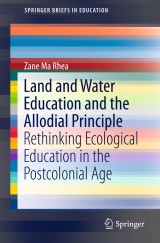Details

Land and Water Education and the Allodial Principle
Rethinking Ecological Education in the Postcolonial AgeSpringerBriefs in Education
|
CHF 65.00 |
|
| Verlag: | Springer |
| Format: | |
| Veröffentl.: | 15.01.2018 |
| ISBN/EAN: | 9789811076008 |
| Sprache: | englisch |
Dieses eBook enthält ein Wasserzeichen.
Beschreibungen
<div>This book argues that the ancient allodial principle enables a paradigmatic shift in the way specialist educators in environmental, Indigenous, and legal studies; teacher educators; and teachers think about land and water education.</div><div><br/></div><div>Land and water are basic to human life, and students will need to grapple with matters of sustainability and Indigenous entitlement in their future work. People now living in lands and on waterways that have been colonized, such as Australia, are taught to regard land and water in ways that have been fundamentally shaped by English law. This book introduces ancient as well as more contemporary forms of land and water access and examines the underlying ontological and epistemological enframements that shape the way that ‘land’ and ‘water’ are understood and taught. As peoples of the world grapple with environmental sustainability and Indigenous rights, the author provides a pivotal rejection of the entitlement to ‘abuse’. The book also reasons that educators should employ alod pedagogy to develop their approach to ‘working out’ difficult matters to do with balancing the rights and responsibilities of nations, regions, corporations, communal and individual owners in the access to, use of, and transferability of land and waterways.</div><div><br/></div>
Land and Water Education: Ontological and Epistemological Considerations.- Allodial Traces.- Pre-Feudal Recognition of the Allodial Principle.- Enclosures and Common Lands and Waterways.- Land and Water as Property and as Relationship.- Land and Water under Colonisation: Allodiality and Colonisation.- Vestigial Allodiality?.- Alod, Land, and Water Education.
Associate Professor Zane Ma Rhea is Academic Leader, Curriculum & Pedagogy Academic Community, Faculty of Education, Monash University. Her research theorizes comparative and cross-cultural understandings of the cultivation of wisdom and examines how higher education, teacher education, and schooling are harming or supporting the sustainable education of wise, global citizens. Originally trained as a social worker in the 1970s, Dr Ma Rhea worked in Australia, UK and Spain before returning to Australia in the late 1980s. She began her academic career in the 1990s and in 1997-1998, she was the Smuts Visiting Fellow in Commonwealth Studies at the University of Cambridge, UK. Dr Ma Rhea’s teaching, supervision, and research spans cross-cultural and comparative perspectives in teacher education, wisdom studies, leadership development, educator development in mainstream service provision to Indigenous peoples, and theorizes pedagogy and curriculum within complex, postcolonial, democratic states.
This book argues that the ancient allodial principle enables a paradigmatic shift in the way specialist educators in environmental, Indigenous, and legal studies; teacher educators; and teachers think about land and water education.<div><br/><div>Land and water are basic to human life, and students will need to grapple with matters of sustainability and Indigenous entitlement in their future work. People now living in lands and on waterways that have been colonized, such as Australia, are taught to regard land and water in ways that have been fundamentally shaped by English law. This book introduces ancient as well as more contemporary forms of land and water access and examines the underlying ontological and epistemological enframements that shape the way that ‘land’ and ‘water’ are understood and taught. As peoples of the world grapple with environmental sustainability and Indigenous rights, the author provides a pivotal rejection of the entitlement to ‘abuse’. The book also reasonsthat educators should employ alod pedagogy to develop their approach to ‘working out’ difficult matters to do with balancing the rights and responsibilities of nations, regions, corporations, communal and individual owners in the access to, use of, and transferability of land and waterways.</div><div><br/></div></div>
Proposes the innovative ‘Alod Pedagogy’ approach to land and water education Provides a unique argument for rethinking land and water education Engages educators with historical material that support postcolonial pedagogical innovation and curricula vision Offers impetus for a foundational rethinking of environmental and ecological education
Diese Produkte könnten Sie auch interessieren:

Community Schools in Africa

von: Deborah Glassman, Chloe O'Gara, Kristin Helmore, Jordan Naidoo, Fred Wood

CHF 59.00















